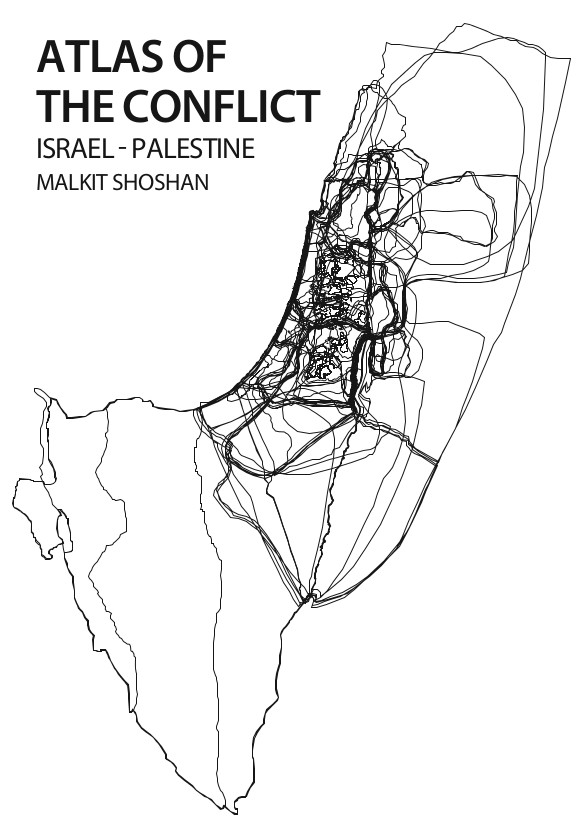Malkit Shoshan: Atlas Of The Conflict, Israel-Palestine (2010/2012)
Filed under book | Tags: · architecture, history, israel, palestine, politics, urban planning, war

The Atlas of the Conflict maps the processes and mechanisms behind the shaping of Israel-Palestine over the past 100 years. Over 500 maps and diagrams provide a detailed territorial analysis of the Israeli-Palestinian conflict, explored through themes such as borders, settlements, land ownership, archaeological and cultural heritage sites, control of natural resources, landscaping, wars and treaties. A lexicon, drawing on many different information sources, provides a commentary on the conflict from various perspectives. As a whole, the book offers insights not only into the specific situation of Israel-Palestine, but also into the phenomenon of spatial planning used as a political instrument.
In the early 20th century, waves of Jewish immigrants swept across the country of Palestine, seeking to impress onto it a new nation. It took over 50 years of local and international transitions to redeem the land; dressing it with uniformity, a new identity, a new landscape, a new people and a new culture while ignoring an existing landscape, an existing people, an existing culture and an existing nation.
In 1948 one nation celebrated its formal recognition by the international community and the other grieved amidst its ruins. This atlas of the Israeli-Palestinian conflict maps the processes and mechanisms behind the modification of the country during the past 100 years, both on a policy level and in its implementations on the ground. With over 500 maps and diagrams this is an indispensable reference book on the conflict. There are lessons to be learnt from the atlas on a broader front, from the withdrawal of the colonial powers in the early 20th century to the forced division of the Middle East and the ongoing wars and disputes over territory and resources.
Maps, plans and diagrams give a neutral, apolitical overview of the protracted conflict in Israel and Palestine.
The book won the Leipzig Art Book Fair’s Golden Letter award for “most beautiful book in the world.” Malkit Shoshan is an Amsterdam-based Israeli architect and founder/director of FAST (Foundation for Achieving Seamless Territory).
Originally published by 010 Publishers, Rotterdam, 2010
Publisher Publication Studio, Portland, OR, 2012
Jank Edition series
ISBN 9789064506888
478 pages
review (Yousef Munayyer, Palestine Center)
review (Esther Zandberg, Haaretz)
review (Régine Debatty, we-make-money-not-art.com)
more reviews
PDF (low resolution, 82 MB)
PDF (high resolution, 389 MB)
Rosalyn Deutsche: Evictions: Art and Spatial Politics (1996)
Filed under book | Tags: · architecture, art, art criticism, public space, space, urban design, urban planning, urbanism

“Since the 1980s a great deal has been written on the relationship between art, architecture, and urban planning and design, on the one hand, and the politics of space on the other. In Evictions Rosalyn Deutsche investigates—and protests against—the dominant uses of this interdisciplinary discourse.
Deutsche argues that critics on both the left and the right invoke harmonious images of space that conceal and justify exclusions—whether the space in question is a city, park, institution, exhibition, identity, or work of art. By contrast, she calls for a democratic spatial critique that takes account of the conflicts that produce and maintain all spaces, including the space of politics itself.
Evictions examines how aesthetic and urban ideologies were combined during the last decade to legitimize urban redevelopment programs that claimed to be beneficial to all, yet in reality tried to expunge traditional working classes from the city. Combining critical aesthetic theory about the social production of art with critical urban theory about the social production of space, Deutsche exposes this unspoken agenda. She then responds to a new alliance of prominent urban and cultural scholars who use critical spatial theory to protect traditional left political projects against the challenges posed by new radical cultural practices.
In her critique, Deutsche mobilizes feminist and postmodern ideas about the politics of visual representation and subjectivity. She also intervenes in debates taking place in art, architecture, and urban studies about the meaning of public space, and places these struggles within broader contests over the definition of democracy. Opposing the nostalgic belief that democracy’s survival demands the recovery of a once unified public sphere, Deutsche contends that conflict, far from undermining public space, is a prerequisite for its existence and growth.”
Publisher MIT Press, Dec 1996
Graham Foundation / MIT Press Series in Contemporary Architectural Discourse
ISBN 0262041588, 9780262041584
xxiv+394 pages
Reviews: Martin Hayes (H-Urban, 1997), Gillian Rose (Env & Planning D: Society & Space, 1997), Gordon Brent Ingram (Fuse, 1997), Christopher Ho (PAJ, 1998).
PDF (updated on 2015-2-19)
Comments (3)Damian F. White: Bookchin. A Critical Appraisal (2008)
Filed under book | Tags: · anarchism, critical theory, deep ecology, democracy, ecology, environmental ethics, marxism, participation, philosophy, political ecology, social theory, urban planning

This is the first comprehensive overview of the work of Murray Bookchin, the left-libertarian social theorist and political ecologist who is widely regarded as the visionary precursor of anti-corporate politics. Bookchin’s writing spans fifty years and engages with a wide variety of issues: from ecology to urban planning, from environmental ethics to debates about radical democracy. Weaving insights from Hegel and Marx, Kropotkin and Mumford, Bookchin presents a critical theory whose central utopian message is ‘things could be other than they are’. This accessible introduction maps the evolution of Bookchin’s project. It traces his controversial engagements with Marxism, anarchism, critical theory, postmodernism and eco-centric thought. It evaluates his attempt to develop a social ecology. Finally, it considers how his thinking relates to current debates in social theory and environmentalism, critical theory and philosophy, political ecology and urban theory. Offering a clear account of Bookchin’s key themes, this book provides a critical but sympathetic account of the strengths and weaknesses of Bookchin’s writing.
Publisher Pluto Press, 2008
Original from the University of Michigan
Digitized Jul 17, 2009
ISBN 0745319645, 9780745319643
Length 236 pages
More info (publisher)
More info (google books)

